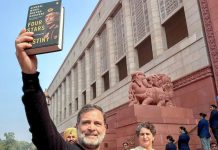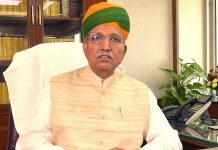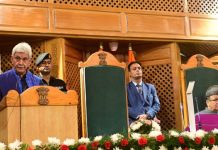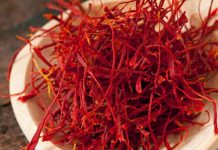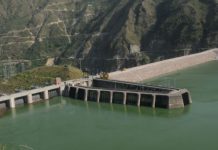What is significant is that the variations of the separatist slogans are now yelled in mainstream political rallies including those of the BJP. The reason for this is that these slogans are known to everyone in the Valley, helping the parties to connect easily with the masses. A report by Riyaz Wani
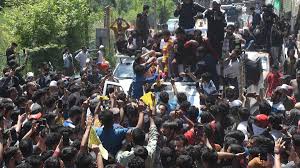
Election rallies in the Valley are reverberating with slogans like ‘Jeet Hamaari, Inshallah (Victory will be ours, God willing).” While the slogan might be typical in an election season, it is anything but. It was last used by the opposition alliance, Muslim United Front, in the allegedly rigged election of 1989.
Not just this slogan, most others being chanted in this Assembly election, and earlier in the recent parliament polls, are adapted from the Valley’s troubled political past. Some of these go far back as this one: “Jis Kashmir jo khoon se seencha, woh Kashmir hamara hai” (The Kashmir we drenched in blood is our Kashmir).
The slogan has separatist origins, tracing back to the struggle for the right to self-determination through the fifties and sixties, spearheaded by Sheikh Mohammad Abdullah, the founder of the National Conference.
Ironically, the slogan along with another one “Ragdo Ragdo, NC Ragdo PDP Ragdo” (Rub out NC, Rub out PDP), were also used by the BJP during the parliamentary election. The slogan was coined by separatists during the six-month long unrest in the Valley in 2008 during which over 100 people were killed. Other parties have adapted the slogans to their own political needs, urging their supporters to “rub out” the other parties including the BJP.
Another slogan, ‘Na Bayi Na (Never, Never)’ that became wildly popular during 2016 unrest in which over a hundred people were killed and more than 1100 were blinded has also caught on. The slogan which expresses refusal to accept oppression or any other injustice from the government is also being repurposed by the parties to suit their ends. Incidentally, the separatist leader Sarjan Barkati, who had conceived the slogan, is in jail for the past some years. He is also contesting the Assembly election from two constituencies – Ganderbal and Beerwah – with his daughter Sugra Barkati leading the campaign on his behalf. And she is drawing crowds wherever she goes.
Traditional political leaders, including Dr. Farooq Abdullah and his son, Omar Abdullah, of the National Conference, are being hailed as lions by their supporters. At rallies, enthusiastic crowds chant, “Aaya Aaya, Sher Aaya” (The lion has come, the lion has come). Similarly, supporters of People’s Democratic Party, and Peoples Conference chairman Sajad Gani Lone, chant, “Nakli shera yeti wat dera, asli shera aa gaya” (Time for fake lions to leave, the real lion has arrived).
The PDP has made a clever use of the slogans coined by the separatists, some of them during the several unrests over the past one and a half decade. For instance one of them goes like: “Na Jhukne Waali PDP, Na Bikne Waali PDP (The party which won’t surrender or sell out is the PDP). The slogan was earlier used to describe the politics of the deceased top separatist leader Syed Ali Shah Geelani. The slogan then went as: Na Jhukne Waala Geelani, Na Bikne Waala Geelani.
This is not the first time that the PDP has adapted separatist symbols to garner public support. In the past, the party has even appropriated parts of the separatist agenda, an exercise that once earned it the label of a soft-separatist party. However, this political agenda helped the party tap into the Valley’s separatist constituency, especially Jamaat-i-Islami cadre in parts of South Kashmir.
These slogans, deeply rooted in Kashmir’s political history, serve as potent symbols of pride, strength, and unity for the Kashmiri people. The slogan “Sher-e-Kashmir Zindabad” (Long live Sher-e-Kashmir), originally used to honour Sheikh Abdullah’s leadership, has now become a rallying cry for various political parties.
In the ongoing Assembly election, these slogans have gained renewed salience, reflecting the changing political landscape of the region. With traditional political parties reclaiming centre stage, the fleeting fame of self-proclaimed “Sher” personas on social media seems to be diminishing.
However, the resurgence of the traditional slogans is not without controversy. The BJP’s use of slogans traditionally associated with separatist sentiments has raised eyebrows. The chanting of “Jis Kashmir jo khoon se seencha gaya hai, woh Kashmir hamara hai” (The Kashmir we drenched in blood is our Kashmir) attracted widespread attention, given its historical association with anti-India protests.
What is significant is that the variations of the separatist slogans are now yelled in mainstream political rallies including those of the BJP. The reason for this is that these slogans are known to everyone in the Valley, helping the parties to connect easily with the masses.

